In this article, we will take an insightful journey into the moral philosophies inherent within the institution of Freemasonry, with its rich allegorical framework, has often paralleled various philosophical traditions.
It presents us with a blueprint for personal development, and today, I would like to unpack that for you in the context of the Degree of Apprentice.
Let me share with you ten central commandments or principles that emerge from Masonic teachings, which mirror ancient ethical precepts and are encapsulated within the Degree of Apprentice.
The First Masonic Commandment emphasizes the necessity of belief in a Supreme Being—God. This isn’t unique to Freemasonry; it draws on ancient philosophic traditions dating back to Plato and Aristotle, who argued for a First Cause or Prime Mover.
In Masonry, the focus is on the love of, reverence for, and adoration of God. In essence, this is a call for spiritual devotion, laying the cornerstone for moral and ethical guidance—a linchpin in many philosophic inquiries.
The Second principle speaks directly to the enactment of virtue. It suggests that our good deeds should not be performed from mere duty but also for the pleasure they bring to us and others.
Here, we see echoes of Aristotle’s virtue ethics, where the virtuous action is its own reward. Freemasonry also encourages associating with the wise, mirroring the Socratic tradition of learning through dialogue and the company of those more learned.
This brings us naturally to the Third Commandment, which carries the essence of the Stoics’ call to inner discipline and their struggle against vice.
The Mason is enjoined to do battle with his own failings—anger, envy, dishonesty—and to promote virtues like humility, compassion, and integrity. This internal struggle reflects what Plato outlined in “The Republic” as a war for the soul’s harmony.
Now, the Fourth Commandment takes us into the virtue of pietas—respect for one’s parents, something deeply enshrined within Roman philosophy.
The care for one’s family is not merely a social obligation but a personal and sacred duty, reflecting Confucian ideals of filial piety as well.
Closely linked with the fourth, the Fifth Masonic Commandment involves cherishing one’s spouse and children and demonstrates loyalty to one’s country—Cicero would have approved of such patriotic feelings.
This dual allegiance to family and state reminds us of the two spheres of human interaction—the oikos and the polis—in ancient Greek thought.
The Sixth Principle revolves around friendship—a topic dear to the heart of philosophers like Epicurus and Aristotle. Freemasonry regards true friends as extensions of self, where loyalty is paramount.
The friendship commandment mirrors those movements in ancient thought that regard the friend as another ‘I’—where the virtues of loyalty, integrity, and support are not only personal but also communal values.
When we come to the Seventh Commandment, the emphasis shifts to avoiding false friends and upholding one’s integrity—themes that reverberate with Socratic ethics.
Maintaining one’s reputation and avoiding hypocrisy align with the ancient Greek saying ‘know thyself,’ advocating for an alignment of one’s public persona with one’s private self.
The Eighth Commandment speaks to moderation—the very tenet of the Delphic maxim ‘nothing in excess’ and a core principle within Stoic and Aristotelian ethics.
Masonry posits that one should temper desires and learn from the missteps of others. Mindful of the human tendency towards excess, this commandment counsels a measured life, heeding the advice of Seneca and Marcus Aurelius.
Coming to the Ninth, we find a principle advocating for cautious speech, avoidance of slander, and righteous deeds.
This commandment reflects the ancient wisdom of thinkers like Epictetus who counselled that we should speak less and listen more, reserving our speech for moments that truly warrant our words. It’s an injunction to practice restraint—a key theme in ancient ascetic practices.
Finally, we arrive at the Tenth Commandment — the pursuit of personal virtue, reflection on one’s nature, and the avoidance of sloth. This could be a page out of Plato’s injunctions for self-knowledge or a Stoic’s call for constant self-improvement, and active engagement in life.
But there is one commandment that overrides all others—a sort of summum bonum or the highest good of Masonic teaching. It is the call to universal love, echoing the teachings of Jesus to love one another and the Buddha’s metta or loving-kindness.
The imploration to replace hatred with love, to find unity and harmony, resonates with the ancient philosophical quest for a life lived well and harmoniously.
Beyond these tenets, Freemasonry proposes itself as an agent of societal transformation. It’s akin to the Socratic role of the philosopher as gadfly, challenging the status quo, resisting tyranny, and standing firm against forces of corruption and ignorance.
The Mason’s tool is his intellect, his compass is justice, and his square is his integrity. Masonry calls on its adherents to live by these principles, to engage actively with the world, and become agents of positive change.
Freemasons are charged with translating lofty ideals into action, much like the ancient philosophers who not only pondered the good life but also exemplified it through their deeds.
As we’ve journeyed through the ten commandments of Freemasonry, what emerges is a timeless vista of ethical principles that resonate deeply with the philosophical traditions of the ancient world.
These principles serve as touchstones for living a life of virtue, for engaging the world with wisdom and compassion, and for aiming toward the betterment of both self and society. Freemasonry, much like philosophy, affirms that the unexamined life is not worth living and that the practice of virtue, in its many forms, is a path worth pursuing.
That concludes our lesson for now. Thank you for your attention and I look forward to your thoughts and reflections on these connections between Freemasonry and ancient philosophy.
Skill Set – Citizen of the World
As a citizen of the world, the knowledge and principles extracted from the lesson, the ten central commandments or principles of freemasonry, can be utilized to foster personal growth, develop leadership skills, and contribute to positive change on a global scale.
Here are some ways in which an individual can apply the teachings of Freemasonry to their own self-improvement and leadership endeavours:
Embrace Moral Values: Incorporate the moral values highlighted in the text, such as integrity, compassion, and humility, into personal decision-making processes. Strive to act virtuously in all aspects of life, treating others with kindness, and upholding the principles of justice, fairness, and respect.
Seek Enlightenment and Knowledge: Embrace a lifelong pursuit of knowledge, wisdom, and personal growth. Engage in continuous learning by exploring diverse ideas, perspectives, and cultures. Cultivate intellectual curiosity, critical thinking, and open-mindedness to broaden one’s perspective and enhance leadership skills.
Develop Self-Control: Practice self-control and emotional intelligence in personal and professional interactions. Mastering one’s impulses and emotions enables effective decision-making, conflict resolution, and the ability to lead by example. This self-discipline enables individuals to approach challenges with clarity, composure, and thoughtful consideration.
Foster Unity and Collaboration: Emphasize the importance of unity among diverse individuals and cultures, recognizing that true strength lies in collective efforts. Promote inclusivity, teamwork, and cooperation, valuing the unique perspectives and contributions of others. Encourage open dialogue, active listening, and the exploration of shared goals and values.
Cultivate Ethical Leadership: Lead with honesty, fairness, and transparency. Demonstrate a strong moral compass and uphold ethical standards in all endeavours. Act as a role model, inspiring others to act with integrity and empowering them to make ethical decisions. Exhibit empathy and compassion towards others, valuing diverse opinions and fostering an inclusive environment.
Embrace Diversity and Respect Differences: Celebrate cultural, ethnic, and ideological diversity. Embrace inclusivity by fostering an environment that respects and values differences of opinion, background, and experiences. Create opportunities for dialogue and understanding, promoting a sense of belonging and unity among diverse individuals.
Commit to Social Responsibility: Extend a commitment to social responsibility beyond personal and professional spheres. Engage in philanthropy, community service, or activism to address social issues, promote equality, and uplift marginalized communities. Encourage others to do the same, inspiring a collective sense of responsibility and fostering positive change.
Cultivate Personal Resilience: Accept and navigate adversity with resilience, as emphasized in the text. Learn from failures and setbacks, using challenges as catalysts for growth and self-improvement. Adapt to changing circumstances, maintain optimism, and persevere in the pursuit of personal and collective goals.
Lead by Example: Lead with authenticity, consistently aligning actions with one’s values and principles. Inspire others through personal integrity, accountability, and a strong work ethic. Demonstrate dedication, humility, and a commitment to continuous self-improvement, serving as a source of inspiration and guidance for others.
Promote Justice and Equality: Champion social justice, equality, and the preservation of individual rights and liberties. Advocate for fairness, equal opportunity, and the eradication of discrimination in all its forms. Take a stand against injustice, advocating for those who have been marginalized or oppressed, and promoting a more just and equitable world for all.
By incorporating these principles into one’s personal and professional life, an individual can enhance their self-improvement journey and strengthen their leadership abilities.
Applying the teachings of Freemasonry from this text allows for the development of an ethical and inclusive leadership style, positively impacting both the self and the wider global community.
Article inspired by Morals and Dogma
Article by: Albert Pike

Albert Pike first joined the fraternal Independent Order of Odd Fellows in 1840. He next joined a Masonic Lodge, where he became extremely active in the affairs of the organisation. In 1859 he was elected Sovereign Grand Commander of the Scottish Rite's Southern Jurisdiction.
Pike remained Sovereign Grand Commander for the rest of his life, devoting a large amount of his time to developing the rituals of the order.
Pike published a book called Morals and Dogma of the Ancient and Accepted Scottish Rite of Freemasonry in 1871, the first of several editions. This helped the Order grow during the nineteenth century.
Pike also researched and wrote the seminal treatise Indo-Aryan Deities and Worship as Contained in the Rig-Veda. In the United States, Pike is still considered an eminent[15] and influential Freemason, primarily in the Scottish Rite Southern Jurisdiction.
32 Degrees of Freemasonry
Inspired by the works of Albert Pike

The ’32 Degrees of Freemasonry’ online course by Square Academy is a comprehensive exploration of the mysteries and symbols of Freemasonry, inspired by Albert Pike’s “Morals and Dogma”.
It is designed not just to impart historical knowledge, but to also serve as a catalyst for personal development and leadership.
With thirty-two lessons, the course promises to unlock deep philosophical knowledge through the examination of Freemasonry’s degrees.
Recent Articles: skills
 7 Soft Skills Taught In Freemasonry Discover how Freemasonry nurtures seven irreplaceable soft skills—collaboration; Communication, Teamwork, Empathy, Flexibility, Conflict Resolution, Active Listening, and Trustworthiness. Explore how these essential human attributes, grounded in emotional intelligence and ethical judgment, remain beyond the reach of AI. |
 Freemasonry and Reskilling in the age of AI The article explores the challenges and strategies organizations face in reskilling their workforce in the era of automation and artificial intelligence. It highlights the need for companies to view reskilling as a strategic imperative and involve leaders and managers in the process. The article also emphasizes the importance of change management, designing programs from the employee's perspective, and partnering with external entities. |
 Ten Central Commandments or Principles of Freemasonry Embrace the wisdom of Freemasonry's teachings in your personal journey towards self-improvement and stronger leadership. By upholding virtues of integrity, compassion, and respect, and uniting these with a commitment to continuous learning and social responsibility, inspire change. Transform yourself and the world around you, fostering a legacy of positivity and enlightenment. |
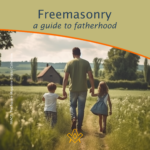 Freemasonry: A Guide to Fatherhood In the sacred halls of Freemasonry, fathers discover a hidden power to transform their parenting journey. With its timeless values, supportive community, and life-enriching teachings, Freemasonry empowers fathers to provide a moral compass, foster self-improvement, build stronger connections, and embrace the confidence and wisdom needed to navigate the complex realm of fatherhood. |
 Courage as a core value in Freemasonry Freemasonry, a revered fraternity, prioritizes virtues like honesty and charity. However, courage is foundational. From Plato to Maya Angelou, courage is vital for other virtues. Freemasonry's teachings, referencing events like Gettysburg, emphasize diverse courage forms. In today's divided world, Masons promote and exemplify courage, understanding its importance in facing challenges. |
 How Freemasonry Cultivates Ideal Entrepreneurial Traits Freemasonry's cryptic rituals hold timeless lessons for building entrepreneurial greatness. Through tests of passion, vision and skill, Masonic teachings forge ideal traits like grit, creativity and alliance-making needed to seize opportunity and elevate enterprises. The right commitment unlocks code for entrepreneurial success. |
 What you see praiseworthy in others "What you see praiseworthy in others, carefully imitate, and what in them may appear defective, you will in yourself amend". This passage of Masonic ritual (Taylors Working, Address to the w |
 How to Learn Ritual with a Learning Disorder So what do you do when faced with that little blue book? Most Masons when first looking at the ritual book can understandably be fazed – the tiny print, the missing words, the questions and answers! Learning ritual can be a challenging task for anyone, especially individuals with learning disorders, but it is not impossible. Here are some tips to help make the process easier. |
 A "mind palace", also known as a "memory palace", is a technique for memorizing and recalling information. How would your life change if you could remember anything and everything? Discover the 'Mind Palace' and all will be revealed. |
 What is leadership and who does freemasonry help develop those skills needed to be a better leader |
 A story of the 'Ruffians' – those individuals whose paths cross ours, who feel entitled to seize and consume the property of others that they have not earned. A lesson to build character to be a better citizen of the world. |
 Now we are back in the Lodge room once again, maybe it is time to review how we learn and deliver ritual and look at different ways of improving that process. |
 Making an advancement in Masonic Knowledge can become far easier when you 'learn how to learn'. |
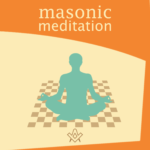 Learn how to practise Masonic meditation in a busy world with all its care and employments |
 Struggling to learn your ritual? Become a 5-Minute Ritualist with the aid of a book of the same name. |
 Day in the life of a Freemason As we start a new year, maybe start it with a new habit? |
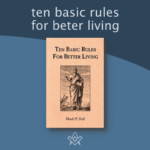 Ten Basic Rules For Better Living Ten Basic Rules For Better Living by Manly P Hall |
 How can we use masonic leadership skills to avoid confrontational situations? |
 How the Trivium is applied to Critical Thinking - {who, what, where, when} - {how} - {why} |
 The Seven Liberal Arts - why 'seven', why 'liberal', why 'arts'? |
 How to improve your public speaking skill with 6 techniques |
 Do you need to speak in public, or present Masonic ritual without notes ? |
 What are logical Fallacies and how to spot them |
 Share one easy tip to learn masonic ritual; Some good tips from Facebook followers |
 How can we use the 7 secrets of the greatest speakers in history |
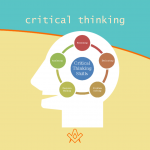 What is a critical thinker and what are their characteristics? |
 Share one personal skill Freemasonry helped you to improve? How can we make practical use of the lessons taught in Masonic writings? |
 An introduction to the art of public speaking - speak with confidence |
 Seven Liberal Arts and Sciences What do you know about Seven Liberal Arts and Sciences |
 Three Words That Will Change Your Life This article discuss a common situation found in many lodges - a difficulty in holding a conversation with a stranger. |
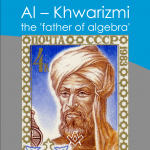 Al - Khwarizmi live c750 - c820 is credited as being the father of Algebra, being asked what is Man, give his answer in an algebraic expression |
masonic knowledge
to be a better citizen of the world
share the square with two brothers

click image to open email app on mobile device






